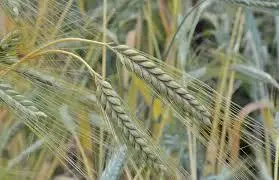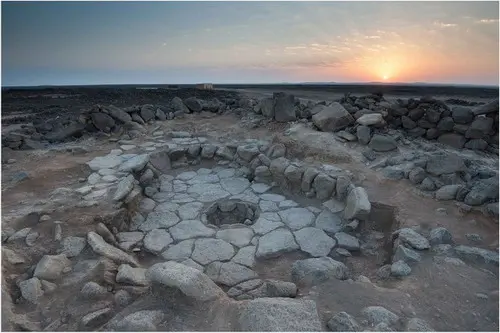The first breads of humanity?

I have already told you in a previous article the beautiful story of the croissants, but do you know what it is about the bread, who "invented" it, where and when?
Well, you can imagine that recent discoveries, in 2018, have profoundly changed the history of bread.
Well, you can imagine that recent discoveries, in 2018, have profoundly changed the history of bread.
12 K 5/5 (14 reviews)
Keywords for this post:HistoryBreadPrehistoryExcavationsExplorationLast modified on: February 16th 2019
The first breads of humanity?
Until recently I had, and maybe you do too, the story of the Egyptians (-4000 BC), who used to eat mainly some kind of pancakes, made with a cereal porridge and then cooked in the oven. One day, according to the legend, a cake was forgotten, fermented and leavened, and instead of throwing it away, they decided to cook it anyway. Surprise, it was better than the patties. Bread had just been invented.
I love these beautiful stories or legends, easy to remember and always well timed. How they have survived the centuries? Mystery, but they are there.
So, the bread is the Egyptians, around 4000 BC? Not so simple... One could say that for bread to be invented, agriculture had to be invented, and in particular the cultivation of cereals?
But agriculture began around 11,000 years ago in the Fertile Crescent, an area that straddles Iraq, Turkey, Jordan, Israel, Egypt and Iran of today.
These seeds were crushed between 2 stones or in mortars, then roasted and eaten. Long before the Natufians, around the Lake of Tiberias in Israel, traces of a fireplace with wild barley and roasted starch were found in a cave dating back to 22,000 years ago.
What about bread?
The Natufians at one time settled in the Wadi rum, the black desert of Jordan, at the time fertile and watered.
In this desert, on the excavation site of Shubayqa 1, we found a hearth, in the center of the photo, not yet an oven, with remains of cooking, burned, which have crossed the millennia.
Many questions remain unanswered after this extraordinary discovery, and in particular if the fact that the bread has little leavened is a choice of the Natoufians or an emergency of the time (we had to leave, and quickly)? Which, by the way, makes a beautiful parallel with the flight of the Hebrews from Egypt and unleavened bread, millennia later.
From all this, I think we should remember several things:
If you want to know more about it, I invite you to listen to the episode of Jean Claude Ameisen's fascinating program on France-Inter "Sur les épaules de Darwin" (On Darwin's shoulders) dedicated to the history of bread, only in french.

I love these beautiful stories or legends, easy to remember and always well timed. How they have survived the centuries? Mystery, but they are there.
So, the bread is the Egyptians, around 4000 BC? Not so simple... One could say that for bread to be invented, agriculture had to be invented, and in particular the cultivation of cereals?
But agriculture began around 11,000 years ago in the Fertile Crescent, an area that straddles Iraq, Turkey, Jordan, Israel, Egypt and Iran of today.


These seeds were crushed between 2 stones or in mortars, then roasted and eaten. Long before the Natufians, around the Lake of Tiberias in Israel, traces of a fireplace with wild barley and roasted starch were found in a cave dating back to 22,000 years ago.
What about bread?
The Natufians at one time settled in the Wadi rum, the black desert of Jordan, at the time fertile and watered.

In this desert, on the excavation site of Shubayqa 1, we found a hearth, in the center of the photo, not yet an oven, with remains of cooking, burned, which have crossed the millennia.

Many questions remain unanswered after this extraordinary discovery, and in particular if the fact that the bread has little leavened is a choice of the Natoufians or an emergency of the time (we had to leave, and quickly)? Which, by the way, makes a beautiful parallel with the flight of the Hebrews from Egypt and unleavened bread, millennia later.
From all this, I think we should remember several things:
- Baking preceded agriculture, and not the other way around, in other words, the first men did not wait to cultivate cereals to make bread, they first baked, and only then did they plant and harvest cereals, thousands of years later.
- The first bakers in the history of mankind were therefore probably Natufians, in present-day Jordan.
- Bread is a food that has accompanied humans since the dawn of time, it is the source of life and evolution of our species, we must never forget it.
If you want to know more about it, I invite you to listen to the episode of Jean Claude Ameisen's fascinating program on France-Inter "Sur les épaules de Darwin" (On Darwin's shoulders) dedicated to the history of bread, only in french.
Lasts posts
The grease spray
As soon as you have something in a recipe that sticks to the mold, the question always arises as to how difficult it is to remove from the mold. There's nothing more frustrating than breaking your cake when unmolding it, because part of it has stuck in the mold. The classic way to avoid this is...August 26th 20253,8495
Cake moulds
When we make a cake, or a cake of the same rectangular shape, we usually take out our usual mould and tell ourselves that the recipe is anyway "for a cake", but is it really that simple?August 25th 20254,4365
Thinning out herbs
If you need to add a long-stemmed herb (tarragon, mint, verbena, thyme, etc.) to a recipe, you'll probably only need the leaves and not the stem, so you'll need to remove the leaves. Leaf removal means keeping only the beautiful leaves, and eliminating the ugly stems and leaves, but how do you do...August 8th 20252,6595
Add a bay leaf
Bay leaf: small in size, but big in flavor. You'll find it in hundreds of recipes, and it's often added to cooking meat, in a sauce or broth, usually accompanied by other herbs or products. It's a staple of Provençal, Mediterranean and Oriental cuisine, but not the only one. Usually, in a...July 31th 20252,7595
Parsley stems
Parsley, whether curly or flat, is a delicious ingredient in many recipes, where it is used both raw and cooked. When used raw, in a salad for example, where it always provides, alone or with other herbs, a remarkable freshness, only the leaves are kept. And when used cooked?July 28th 20252,980 13
Other pages you may also like
The grease spray
As soon as you have something in a recipe that sticks to the mold, the question always arises as to how difficult it is to remove from the mold. There's nothing more frustrating than breaking your cake when unmolding it, because part of it has stuck in the mold. The classic way to avoid this is...August 26th 20253,8495
A few tips for effective kneading at home
When you have to knead dough for bread or some other recipe, you may well use a food processor or the type of machine known as a stand mixer. The best-known brands are Kenwood and KitchenAid. They are useful tools, but here are a few tips to help you get the best out of them.June 23th 2021280 K 23.7
85 grams of eggs?
Some time ago, I already spoke to you about the difference between baking and pastry-making, I emphasized, among other things, the precision of pastry-making which requires grams, cm, degrees and minutes. That's why, on the one hand, you have baking and cooking, where a certain tolerance is...November 26th 201854 K4.6
The 3 secrets of Parisian flan
A flan Parisien, or boulanger, is a simple yet delicious cake. A cream, a mixture of milk, eggs and sugar, is poured into a raw pastry base and baked in the oven until the pastry and cream are cooked. This is the simplest version of the recipe, probably the original one, but nowadays the cream...July 21th 202313 K4.7
The art of the charlotte
In cooking, a charlotte is a delicious moulded dessert, with biscuits around the outside that have been soaked in a flavoured syrup, filled with a light cream or mousse. The charlotte is left to set in the fridge before being turned out and served in slices. It is very light and a lovely sweet...February 27th 201344 K4.3
Post a comment or question
Follow this page
If you are interested in this page, you can "follow" it, by entering your email address here. You will then receive a notification immediately each time the page is modified or a new comment is added. Please note that you will need to confirm this following.
Note: We'll never share your e-mail address with anyone else.
Alternatively: you can subscribe to the mailing list of cooling-ez.com , you will receive a e-mail for each new recipe published on the site.








